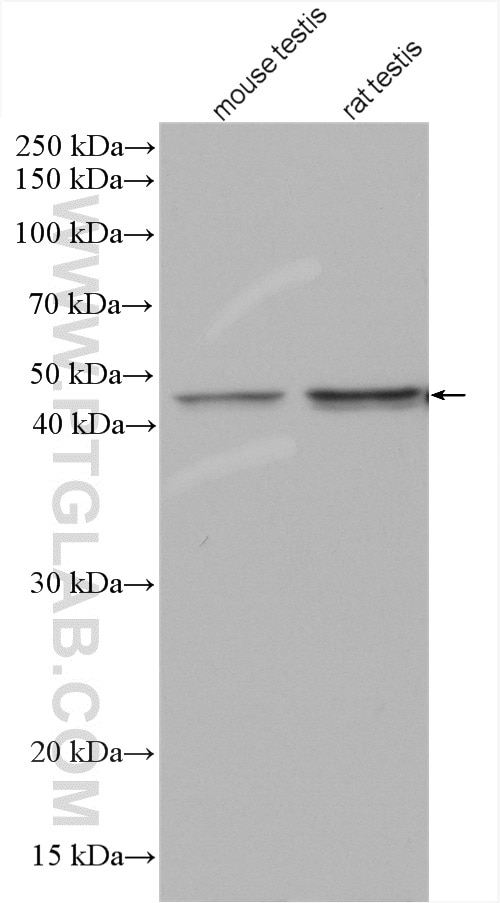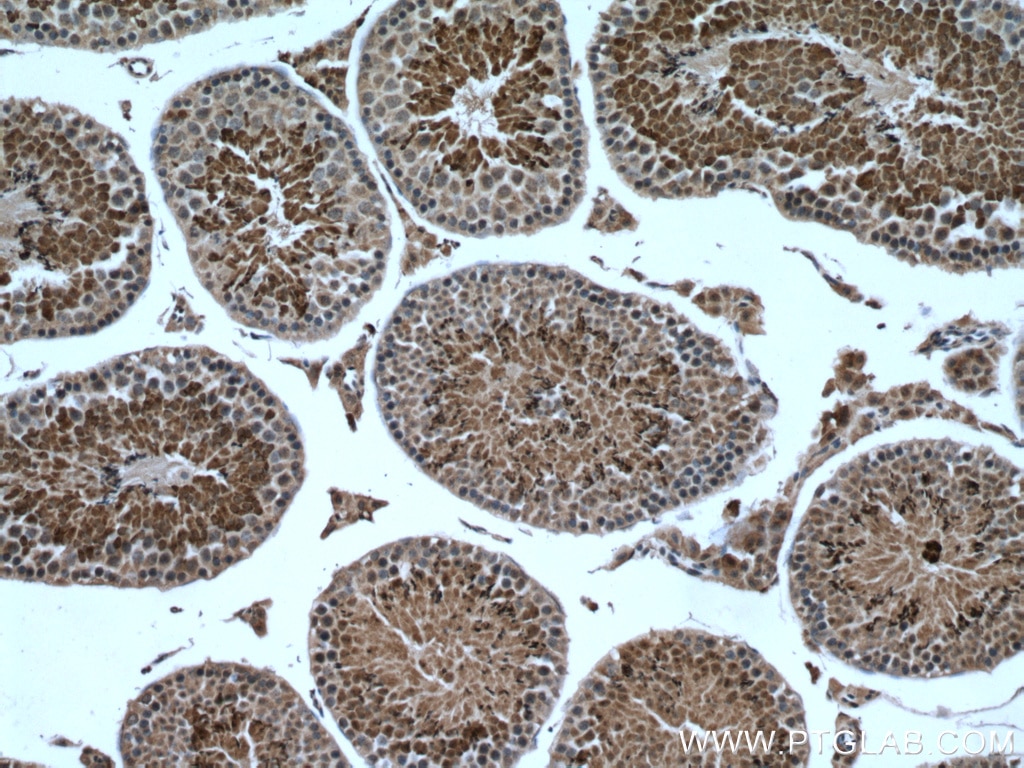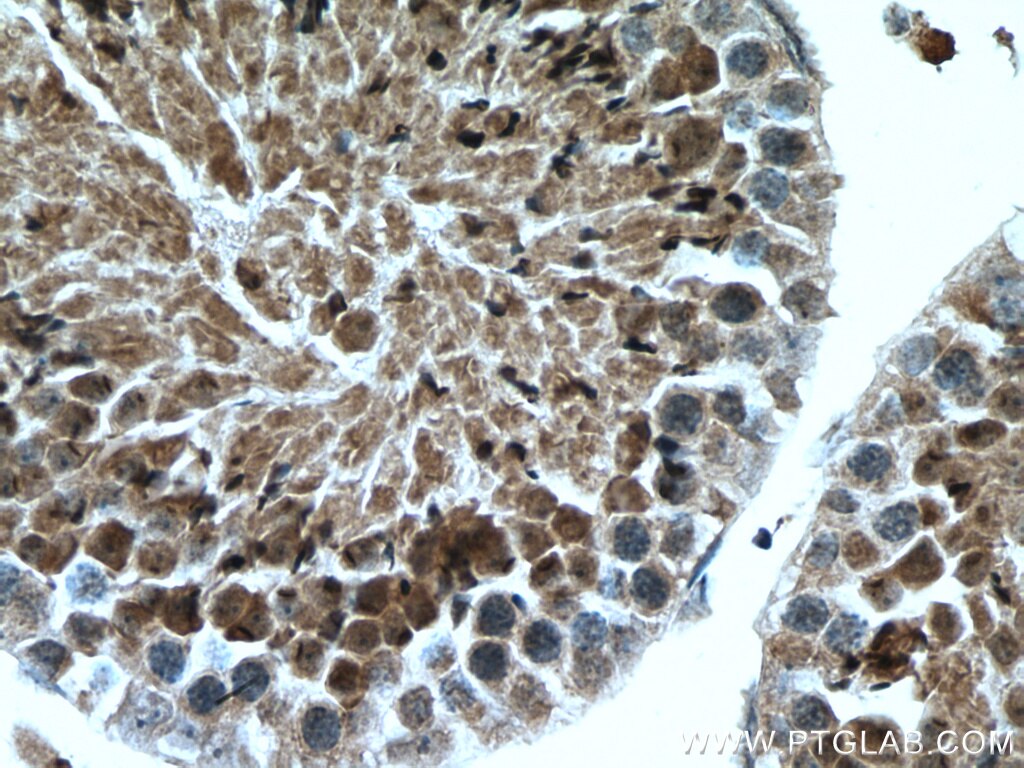Tested Applications
| Positive WB detected in | mouse testis tissue, rat testis tissue |
| Positive IHC detected in | mouse testis tissue Note: suggested antigen retrieval with TE buffer pH 9.0; (*) Alternatively, antigen retrieval may be performed with citrate buffer pH 6.0 |
Recommended dilution
| Application | Dilution |
|---|---|
| Western Blot (WB) | WB : 1:1000-1:5000 |
| Immunohistochemistry (IHC) | IHC : 1:50-1:500 |
| It is recommended that this reagent should be titrated in each testing system to obtain optimal results. | |
| Sample-dependent, Check data in validation data gallery. | |
Published Applications
| WB | See 8 publications below |
| IHC | See 1 publications below |
| IF | See 11 publications below |
| IP | See 2 publications below |
| CoIP | See 3 publications below |
Product Information
17355-1-AP targets ACTL7A in WB, IHC, IF, IP, CoIP, ELISA applications and shows reactivity with human, mouse, rat samples.
| Tested Reactivity | human, mouse, rat |
| Cited Reactivity | human, mouse |
| Host / Isotype | Rabbit / IgG |
| Class | Polyclonal |
| Type | Antibody |
| Immunogen |
CatNo: Ag10613 Product name: Recombinant human ACTL7A protein Source: e coli.-derived, PET28a Tag: 6*His Domain: 1-280 aa of BC014610 Sequence: MWAPPAAIMGDGPTKKVGNQAPLQTQALQTASLRDGPAKRAVWVRHTSSEPQEPTESKAAKERPKQEVTKAVVVDLGTGYCKCGFAGLPRPTHKISTTVGKPYMETAKTGDNRKETFVGQELNNTNVHLKLVNPLRHGIIVDWDTVQDIWEYLFRQEMKIAPEEHAVLVSDPPLSPHTNREKYAEMLFEAFNTPAMHIAYQSRLSMYSYGRTSGLVVEVGHGVSYVVPIYEGYPLPSITGRLDYAGSDLTAYLLGLLNSAGNEFTQDQMGIVEDIKKKCC Predict reactive species |
| Full Name | actin-like 7A |
| Calculated Molecular Weight | 435 aa, 49 kDa |
| Observed Molecular Weight | 49 kDa |
| GenBank Accession Number | BC014610 |
| Gene Symbol | ACTL7A |
| Gene ID (NCBI) | 10881 |
| RRID | AB_2273677 |
| Conjugate | Unconjugated |
| Form | Liquid |
| Purification Method | Antigen affinity purification |
| UNIPROT ID | Q9Y615 |
| Storage Buffer | PBS with 0.02% sodium azide and 50% glycerol, pH 7.3. |
| Storage Conditions | Store at -20°C. Stable for one year after shipment. Aliquoting is unnecessary for -20oC storage. 20ul sizes contain 0.1% BSA. |
Background Information
ACTL7a is located in the acrosome and tail of mature spermatozoa and plays an important role in spermiogenesis. Recently mutation of ACTL7A has been linked to infertility.
Protocols
| Product Specific Protocols | |
|---|---|
| IHC protocol for ACTL7A antibody 17355-1-AP | Download protocol |
| WB protocol for ACTL7A antibody 17355-1-AP | Download protocol |
| Standard Protocols | |
|---|---|
| Click here to view our Standard Protocols |
Publications
| Species | Application | Title |
|---|---|---|
Am J Hum Genet Homozygous pathogenic variants in ACTL9 cause fertilization failure and male infertility in humans and mice. | ||
Hum Reprod Deletion of ACTRT1 is associated with male infertility as sperm acrosomal ultrastructural defects and fertilization failure in human | ||
Hum Reprod ACROSIN deficiency causes total fertilization failure in humans by preventing the sperm from penetrating the zona pellucida | ||
Hum Reprod Novel bi-allelic variants in ACTL7A are associated with male infertility and total fertilization failure. | ||
Hum Reprod Loss of SPACA1 function causes autosomal recessive globozoospermia by damaging the acrosome-acroplaxome complex. | ||
Development Loss of perinuclear theca ACTRT1 causes acrosome detachment and severe male subfertility in mice. |








